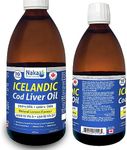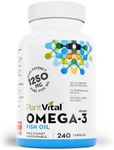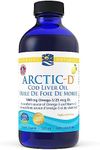Buying Guide for the Best Cod Liver Oils
Choosing the right cod liver oil can make a big difference in supporting your overall health, especially for your heart, brain, and joints. Cod liver oil is a natural source of omega-3 fatty acids and vitamins A and D, but not all products are the same. When shopping, it's important to look beyond the label and understand what makes one cod liver oil different from another. By focusing on a few key specifications, you can find a product that matches your health goals and preferences.Omega-3 ContentOmega-3 fatty acids, especially EPA and DHA, are the main beneficial components in cod liver oil. These nutrients support heart, brain, and joint health. The amount of omega-3s can vary widely between products. Some oils are more concentrated, offering higher amounts per serving, while others are less potent. If you want maximum health benefits, look for higher omega-3 content, but if you are just starting or have a sensitive stomach, a moderate amount may be easier to tolerate. Your choice should depend on your health needs and how much omega-3 you want to add to your diet.
Vitamin A and D LevelsCod liver oil is naturally rich in vitamins A and D, which are important for vision, immunity, and bone health. However, too much of these vitamins can be harmful, especially if you already get them from other supplements or your diet. Some cod liver oils have higher or lower levels of these vitamins, depending on how they are processed. If you need extra vitamins, a higher content might be helpful, but if you are concerned about getting too much, look for products with moderate or lower levels. Always consider your total daily intake from all sources.
Purity and TestingBecause cod liver oil comes from fish, it can sometimes contain impurities like heavy metals or toxins. Reputable brands test their oils for purity and safety, and may mention third-party testing or certifications. If purity is important to you, look for oils that are tested for contaminants and meet safety standards. This is especially important for children, pregnant women, or anyone with health concerns.
Form (Liquid vs. Capsules)Cod liver oil is available as a liquid or in capsule form. Liquids are often more cost-effective and can be easier to adjust the dose, but some people dislike the taste. Capsules are tasteless and convenient, but may be harder to swallow for some and can be more expensive per serving. Your choice depends on your preference for taste, convenience, and how you plan to take the oil.
Flavor and AdditivesSome cod liver oils have added flavors to mask the fishy taste, while others are plain. There may also be added antioxidants or preservatives to keep the oil fresh. If you are sensitive to flavors or want a more natural product, look for oils with minimal additives. If taste is a concern, a flavored option might make it easier to take regularly.
Source and SustainabilityThe origin of the cod and how it is harvested can affect the quality and environmental impact of the oil. Some products use sustainably sourced fish and may have certifications to show this. If you care about the environment or want to support responsible fishing, look for oils that mention sustainable sourcing or eco-friendly practices.















